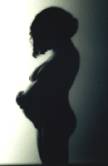Fetal Cells Detected in Mothers' Blood Years After Donor Egg Pregnancies
Finding could lead to advances in organ transplantation and stem cell research.
|
E-mail this article
Subscribe to news
Printer friendly version
|

(SOURCE: Brigham and Women's Hospital, news release, April 2, 2008)
WEDNESDAY, April 2 (HealthDay News) -- Fetal cells remain in the blood of women who had pregnancies with donor eggs for years after they had the baby, a new study says.
The fact that these fetal cells aren't destroyed by the mother's immune system points to an immune system suppression mechanism that may be harnessed to help prevent transplant rejection, said the researchers, who added that these stem cells may provide an easily accessible source of stem cells.
The researchers, from Brigham and Women's Hospital in Boston, analyzed the blood of 11 healthy women, ages 18 to 60, who had a male baby using a donor egg. Male cells were found in the blood of the women up to nine years after they'd had the child.
"These findings may impact how we think about using stem cells in regenerative medicine, because the 'foreign' fetal cells are not rejected by the mother's immune system, even in donor egg pregnancies," study lead author Dr. Zev Williams, a chief resident in the department of obstetrics and gynecology, said in a prepared statement.
"Not only do we want to understand the novel mechanism that suppresses the immune system's surveillance response, but we want to know if these fetal cells can be a source of stem cells later in life for the mother and even for unmatched patients, which could eliminate the need for stem cell banking," Williams said.
"It is also interesting to note that, after a donor egg pregnancy, the mother and child do, in fact, share DNA, albeit at a very low level, and therefore do have a biological connection," Williams added.
The study was published online this week in the journal Fertility and Sterility.
More information
The U.S. National Institutes of Health has more about stem cells.
Copyright © 2008 ScoutNews, LLC. All rights reserved. 
HealthDayNews articles are derived from various sources and do not reflect federal policy. healthfinder.gov does not endorse opinions, products, or services that may appear in news stories. For more information on health topics in the news, visit the healthfinder.gov health library.